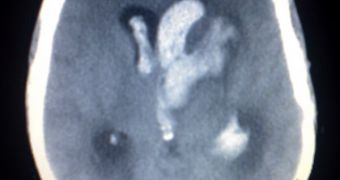Healthcare experts say that bodily functionality can be recovered faster after suffering a stroke, if patients are helped to deal with their depression. The two conditions oftentimes go hand in hand, and treating the mental aspect of the duo can help people get back on their feet faster.
It is estimated that roughly 33 percent of all people who suffer a stroke go on to develop depression afterwards, and for good cause. For many, the fact that they suffered such an event is a painful reminder of the counters our lifetimes have.
A great deal of uncertainty about the future and one's own body also ensues, as people become somewhat disappointed that their bodies gave up on them. All of these feelings can easily lead to depression in its ugliest forms, experts say.
By helping these persons deal with their mental disorder, friends, families and doctors may be doing them a lot of good. A new study proves that handling depression improves stroke recovery rates considerably above average.
In the research, experts found decreased functional capabilities in stroke patients that were still depressed three months after suffering the attack. Conversely, those who were treated for depression fared a lot better than the average, and got back a lot more of their functional capabilities.
Some of the most basic tasks that go on to become a burden for people who suffered from strokes include eating, getting dressed, picking up objects and so on. In other words, things they took for granted before suddenly become impossible to perform.
During the recent investigation, scientists learned that people who were treated for depression after suffering from a stroke were a lot more capable of performing these simple, functional tasks, than those in a control group who received no attention of their mental disorder.
“The relationship between post-stroke depression and recovery of function after a stroke has not been well understood,” explains the first author of the study, Regenstrief Institute investigator Arlene A. Schmid, PhD.
“Previous researchers have looked at both depression and function after stroke but they did not investigate whether identifying and managing depression improved ability to accomplish tasks of daily living and other function related issues,” she adds.
The expert also holds an appointment as an assistant professor of occupational therapy at the Indiana University School of Health and Rehabilitation Sciences, PsychCentral reports.
“Restoring lost function after stroke is the number one reason individuals visit occupational therapists,” Schmid goes on to say.
“Since treating depression helps improve function, occupational therapists should screen for post-stroke depression and, in conjunction with other members of the patient’s health care team, help manage depression,” she concludes.
Details of the new study were published in the March 15 issue of the esteemed scientific journal Neurology.

 14 DAY TRIAL //
14 DAY TRIAL //